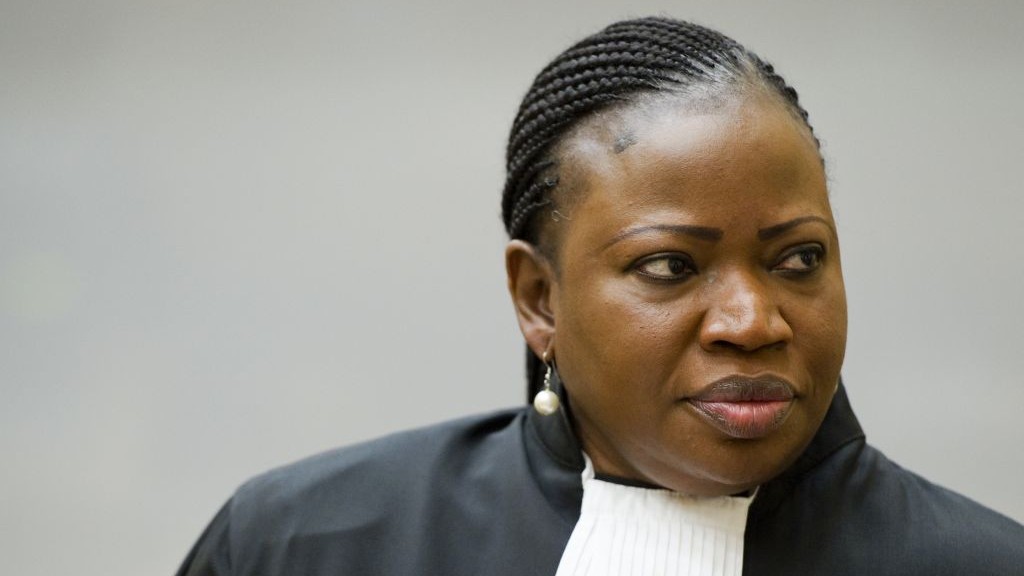US secretary of state says International Criminal Court’s move ‘unfairly targets’ Jewish state, calls for direct negotiations between Israel and the Palestinians
By TOI STAFF

US Secretary of State Mike Pompeo speaks at the State Department in Washington, December 11, 2019. (AP Photo/Alex Brandon)
US Secretary of State Mike Pompeo on Friday decried a decision by the International Criminal Court’s chief prosecutor to proceed with an investigation into war crimes allegedly committed in the Palestinian territories.
“We firmly oppose this and any other action that seeks to target Israel unfairly,” Pompeo said.
“We do not believe the Palestinians qualify as a sovereign state, and they therefore are not qualified to obtain full membership, or participate as a state in international organizations, entities, or conferences, including the ICC.”
ICC chief prosecutor Fatou Bensouda said on Friday that she was “satisfied that there is a reasonable basis to proceed with an investigation into the situation in Palestine.”
She added that “there is a reasonable basis to believe that war crimes were committed in the context of the 2014 hostilities in Gaza” by the Israel Defense Forces for allegedly launching disproportionate attacks and “willful killing and willfully causing serious injury to body or health… and intentionally directing an attack against objects or persons using the distinctive emblems of the Geneva Conventions.”
She said there was also “reasonable basis to believe that members of Hamas and Palestinian armed groups committed… war crimes” by targeting civilians and torturing individuals.
Her statement indicates that a full investigation could be launched, which could include charges against Israelis and Palestinians.
Prime Minister Benjamin Netanyahu on Friday lambasted the move as “a dark day for truth and justice,” calling Bensouda’s ruling “scandalous and baseless.”
He said the decision made the Hague-based court, which Israel has refused to sign up to since its creation in 2002, a “political tool” against the Jewish state. He claimed Bensouda “entirely ignored serious judicial arguments we presented.”
Netanyahu argued that the ICC “has no authority to adjudicate the matter. It has jurisdiction only in lawsuits presented by sovereign states, but there has never been a Palestinian state. We will not accept or acquiesce to this injustice. We will continue to fight it with all the tools at our disposal.”

He also expressed astonishment that Bensouda “says it is a crime, a war crime, for Jews to live in their homeland, the land of the Bible, the land of our forefathers.” Bensouda had said Israel’s policy of settling its civilians in the West Bank could constitute a crime.
The Palestinian Authority welcomed the decision, calling it “a long overdue step to move the process forward toward an investigation, after nearly five long and difficult years of preliminary examination.”
PA President Mahmoud Abbas said “we have achieved what we want. Starting today, the ICC will be able to accept the claims we made in the past.”
“It’s a historic day. Every Palestinian that has been injured can file a lawsuit in court against Israel,” Abbas said.
Saeb Erekat, Secretary-General of the Palestine Liberation Organization, said it was “a positive, encouraging step that brings Palestine closer to the opening of a criminal investigation against war crimes that have been committed, and to an end to the immunity of those who committed the crimes.” He added that it would “contribute to prevention of crimes.”
Despite being accused by Bensouda of possible war crimes itself, the Hamas terror group welcomed the decision, saying it “reveals the character of the Israeli occupation in the international system [and] the immensity of the injustice carried out against the Palestinian people.”
Anticipating Bensouda’s announcement, Israeli officials had earlier made public a legal opinion by Attorney General Avichai Mandelblit arguing that the court has no jurisdiction for an investigation. He claimed that by turning to the ICC, the Palestinians were seeking “to push the Court to determine political issues that should be resolved by negotiations, and not by criminal proceedings.”

According to the Foreign Ministry’s legal adviser, Tal Becker, “There is a Palestinian effort to criminalize the conflict, where only the Israelis have legal obligations and only the Palestinians have rights. But as history has shown, that will only drive the two sides further apart.”
The preliminary examination by the ICC was launched in 2015 after the Palestinian Authority signed the Rome Statute and formally accepted the court’s jurisdiction over its territory. It probes Israeli construction beyond the Green Line, the 2014 Gaza War and the so-called March of Return Gaza border protests that began in March 2018.
Bensouda has in the past indicated that the question of whether the court has jurisdiction was a complicated one, which is why the attorney general last year decided to issue a paper explaining Israel’s point of view, said Roy Schöndorf, the deputy attorney general for international law at the Justice Ministry.
The attorney general’s report only deals with the ICC’s supposed lack of jurisdiction. Mandelblit did not address other matters the prosecutor has to take into account as she weighs whether to open an investigation, such as whether the alleged crimes are grave enough to merit the court’s involvement, or whether local courts can be relied on to investigate these alleged crimes.
Earlier this month the ICC’s Report on Preliminary Examination Activities had made headlines in Israel for stating that Bensouda “followed with concern proposals advanced during the recent electoral process, to be tabled to the Knesset, for Israel to annex the Jordan Valley in the West Bank.”
Netanyahu has repeatedly promised to quickly apply Israeli sovereignty over the Jordan Valley — a quarter of the West Bank — if he is able to put together a new government amid the ongoing political gridlock. His Likud party has even claimed that the premier is only interested in staying in office for an additional six months — a unity coalition negotiation demand — in order to see the promise through.
The Palestinians, too, were unhappy about this year’s report, as it highlighted the Palestinian Authority police’s alleged torture of civilian detainees and the PA’s financial compensation of those involved in carrying out terror attacks against Israelis.
AFP contributed to this report.



This is the third time this issue has come up before the ICC. The judges have been insisting that the prosecutor move forward when she has been unable to in the past. She was first criticized in the first round of attempted prosecution’s for being decidedly pro-muslim being a Muslim herself.
There is nothing more dangerous for court to do than to render a judgment where they have no power of enforcement. The blowback will simply be against the validity of the Court’s decision itself. Who will take up the decision and uses to effectuate what kinetic action?